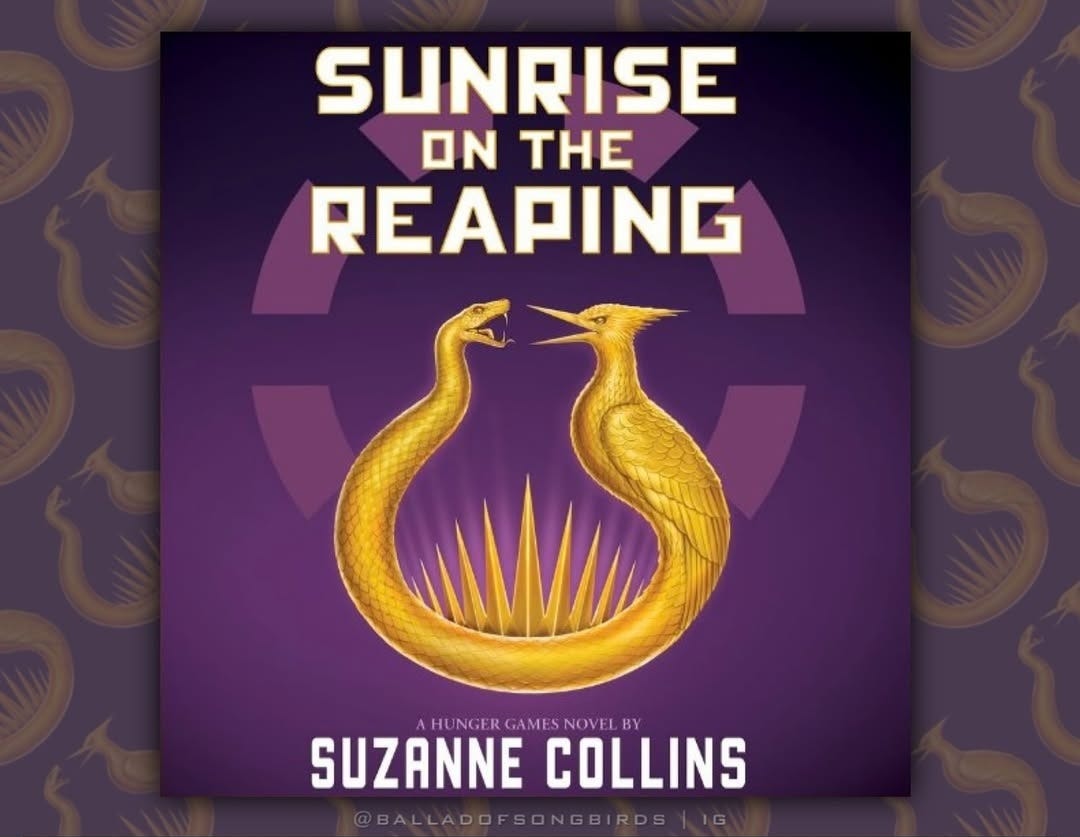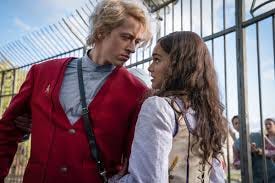Hello, readers.
Sunrise on the Reaping comes out today. This is the most excited I've been for a book in a while.
I imagine this is how boomer dads feel about a new David McCullough, or white women feel when Reese makes a new book club selection.
I admit, I'm late to the party on Hunger Games. When the first novel came out in 2008, I was in my last year of grad school and wouldn't be caught dead with a YA novel. I was catching up on Dostoevsky, Henry Miller, and John Fowles. Besides, why read The Hunger Games when I had already read Koushun Takami’s Battle Royale?
When the first Hunger Games movie came out, I became more interested, but only because Jennifer Lawrence was in it. She was coming off of an excellent performance in the gritty Winter's Bone, one of my favorite movies of 2010 mainly because of her performance and I have a thing for movies dealing with the seedy underbelly of the Ozarks.
But it's not like I went out to the theaters to see the thing. No, I saved my ticket money for serious films like Margin Call and Terrence Malick's The Tree of Life. When I did finally see the movie, renting it out of Redbox, I was less than enthused. Why the costumes? Why so much hair? Why Lenny Kravitz? I felt like it was more style over substance.
Mind you, I still hadn't read the first book yet.
Fast forward through two more written sequels and three other shakily-produced films and you had what I thought was a dead franchise, not worth my time.
Then cut to 2020. Working as a school librarian, I knew the fourth book The Ballad of Songbirds and Snakes was going to be hot. To prep, I bought a bunch of extra copies of all three Hunger Games novels. I figured that I would dedicate a summer to reading the whole series and finally see what all the hype was about.
But like all best laid plans at that time, COVID laid them to ruin.
The books were finally delivered to my school, but I was unable to get to them. We were on an indefinite summer break starting in March of that year and during the next school year, students were not even allowed to check out books.
I could have easily read all four books during that time, but obviously, there were other more important things on my mind, like keeping my newborn baby safe. And with what time I did have for leisure, the last thing I wanted to do was read a book about an authoritarian government forcing kids to kill each other.
I will admit that my first foray into reading The Hunger Games series was through Songbirds and Snakes. I finally found the time to listen to the audiobook in 2023.
And holy shit…it was amazing. The story of Coriolanus Snow and Lucy Gray Baird’s unlikely alliance hooked me from the first few minutes. It was gritty, well-written, and seemed very sophisticated. And might I add, fun.
And did I catch a subtext or two in there? And here I had written it off as Twilight with bows and arrows.
What is so interesting about that book is the examination of a dictator’s rise to power and the sacrifices they are willing to make to gain and retain their power. “Coryo” started out with so much promise, but alas, absolute power corrupts absolutely.
So of course, it was time for me to finally read The Hunger Games, despite already knowing pretty much what I needed to know. However, I wanted to rinse the bad taste in my mouth left from watching those sloppy and garishly produced movies.
What intrigues me so much about the first Hunger Games book is its ability to make sweeping commentary on a bunch of world issues in a compact form, replete with a kick-ass female protagonist. Unlike Battle Royale, the book is less about “the games” themselves and more about the fragility of democracy and the dangers of unchecked power. It shouldn’t come at any surprise at this point that democracy can manipulated and twisted to serve the interests of the most powerful. Tune into any news outlet for a front-row seat to see this in action.
So I don’t think it is any secret what Suzanne Collins is doing within that book. She’s not very subtle and sometimes she will drill a point until it becomes overkill. But if anything, she is impressing the importance of community and social connection in times of “Dark Days.” Yes, things are terrible in the world of Panem, but no matter how awful things become, you can always have empathy for others and show decency in the face of evil. Katniss is a powerful example of what happens if you refuse to compromise your beliefs or integrity, and I think we could all use a little bit more of “standing up for what is right.”
Now, as far as Sunrise on the Reaping goes, I’m not sure what we are going to get. Haymitch Abernathy is not Katniss, and most of what we really know about him is manufactured by the Capitol or told second-hand during drunken anecdotes delivered by none other than Woody Harrelson.
So here’s what we know.
Haymitch was District 12’s second Games winner (after Lucy Gray) in the 23 years leading up to Katniss’s victory. We know that the Games he participated in was violent and brutal, doubling the number of Tributes since it was a Quarter Quell.
We know that he is a tortured character, living most of his life in the bottle after his entire family and girlfriend were killed after he won the 50th Games. Apparently, the way in which he won the games was seen as a direct offense to the Capitol and President Snow.
So for the next 23 years as part of his sentence, Haymitch is forced to half-heartedly mentor tributes from District 12 until he finds a victory with Katniss. I won’t bore you by retelling you what you already know about Haymitch in Catching Fire and Mockingjay, but it ultimately ends pretty well for him, as he gets to retire to District 12 to get drunk and raise geese. Such is the life for a unwitting ally during the Second Rebellion.
So if we already know how it ends for Haymitch, why write a book about him? Well, perhaps his story is the anti-Snow story—Snow starts with very little and is able to build momentum and gain his power, while Haymitch is a born winner who loses everything. Seeing the cause to his effect is compelling and enough to sustain its own novel.
I also think his story is captivating because like Katniss’s story, his story is also about the nature of authority and demonstrates the trials and tribulations one faces when at the ultimate crossroads: to be complacent or rebel?
We know it takes Haymitch a long period of growth and self-discovery to become the man that he was always meant to be. So today, I hope some 12 year old who picks up the book realizes that sometimes the only way to discover yourself or win against an evil regime is by playing the long game.








“Sloppy and garishly produced” you’re so wrong for thattt
Great post